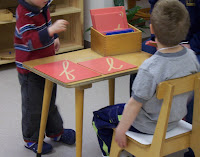Developmental studies at the time of Dr. Montessori's research were called scientific education but, in her opinion, were incorrectly named. Montessori felt there was no evidence of "education" in the studies because no attempt had been made to improve the educational system. She also maintained that no true observations of children could be made within schools as they existed before she began to implement her method. "These made the students adopt an attitude of weariness or of 'self-defence' instead of enabling them to give expression to the creative energies that naturally belonged to them" (Discovery of the Child, 1999, p. 43).
Dr. Montessori's intention was to develop the 'whole child' through motor, sensory, and intellectual activities. She took detailed measurements of each child and tracked both their mental and physical growth. She had doctors weigh the children and measure their heights. Heads and chests were measured and each child was given a yearly medical exam. She introduced nutrition and hygiene into her program and she encouraged her teachers to talk with the children's parents to obtain a better understanding of each child's family situation. In short, Dr. Montessori was the first to incorporate all aspects of child development into an education method.
Although authentic Montessori programs continue to promote the study of the whole child there's still a need to separate the different developmental aspects in order to aid child observation. Psychologists have separated child development into six categories - physical, intellectal, emotional, language, social, and spiritual.
How a child's body grows and changes is the most obvious development. Physical development begins at birth and continues on throughout childhood. The rate of physical change is not, however, a constant among all children, and this can greatly impact a child's emotional and intellectual development simply by the ways in which others respond to her. For example, if a child is shorter than most children of her age, she may be treated like a much younger child.

The moment a child is born, intellectual development begins. A newborn child is beginning to form concepts when she feels cold air on her skin. As she grows, she will recognize her mother's voice and cry if she is hungry. She is learning, solving problems, recognizing people and things, and beginning to understand concepts. By the time she is of primary school (preschool) her most obvious characteristic is self-centred behaviour meaning everything that happens around her is for her. To a child of this age, tactile experiences are imperative because of the information gleaned from each new experience. In a Montessori enrironment, this need is beautifully accommodated through use of the sensorial materials.
Proper development of the emotions is crucial for good self-esteem and self-perception. When a child is in a positive environment in which her emotional needs are met she is free to think and act in the best way she knows how.
Communication or language development begins with a baby's first cry and continues through to learning how to read and write. It also means listening and understanding. This can be seen very clearly by observing a child of two who may use only a hundred words or so but, by the time she is three, has learned over one thousand.
How a child learns to relate to other and becomes a contributing member of a community or group is the aspect of social development. Learning to share, acquiring friends, or having constructive arguments are all vital steps toward becoming a social being.
Finally, the term spiritual development has nothing to do with any religious concept. Rather it is the developmental aspect that allows a child to relate to others in an ethical, moral, and humane fashion. It involves understanding the needs and feelings of others and, later, concern for the needs and fellings of others.
The reason I write all of this is because identification of the various aspects of child development is intrinsic to the objective observation of children. Within a properly prepared Montessori environment there is offered an intergrated approach to the developmental needs of the whole child. In such an environment the child gains independence on both an emotional and social level which enables her to become comfortable and confident in her ability to understand the world, ask questions, seek out answers and learn without being driven by an adult. It is a place where all aspects of child development are allowed to flourish.




5 comments:
First time at your blog very informative.I really what to know are you in any way related to Susan Dyer(themoveablealphabet}?
Hi:
I was wondering when/if someone would ask that question. No, I am not related to Susan although I greatly admire her. And,as far as we know, either is my husband. Just a good old Scottish name. (Apparently his clan used to dye the kilts hence the name.)
Cynthia
Thank you for such a thorough and well explained post. What great topics for observation! I'll be sure to apply them in the coming weeks!
I'm glad it was useful. One of the mothers in our parenting class asked to learn more about child development, so I dredged this bit up from an old essay I wrote during training.
Thanks for commenting.
Hi,
You have been featured on The Montessori Goldmine, please pop over and have a look, if you are not happy with the post please let me know, I will happily remove it. If you are happy, please help me spread the word, help yourself to a badge and tell all your friends. Thanks,
Jo
http://themontessorigoldmine.blogspot.com/2010/04/science-of-wednesday.html
Post a Comment